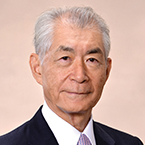
For his groundbreaking, Nobel Prize winning discovery of the PD-1 protein and its ligands, PD-L1 and PD-L2, and for demonstrating the ability of anti-PD-L1 antibodies to inhibit tumor growth, igniting a renaissance in the examination of the role of the immune system in cancer.
A cancer research luminary, Dr. Honjo is revered for his seminal contributions to the field of cancer immunology. Dr. Honjo is celebrated for defining the mechanism by which variable gene fragments of immunoglobulin genes are rearranged during B cell development, subsequently establishing a molecular framework that may react to multiple antigens across different tissues. In the pursuit of elucidating this mechanism, Dr. Honjo discovered activation-induced cytidine deaminase (AID), critical for class switch recombination and somatic hypermutation and cloned the cytokines interleukin (IL)-4 and interleukin (IL)-5. Dr. Honjo’s research delineated the mechanism by which B cells switch their antibody production based on the type of antigen presented, a process commonly referred to as class-switch recombination. By characterizing the response of B cells activated with IL-4 and AID, Dr. Honjo successfully recapitulated class switch recombination in vitro and helped establish what is now a basic principle of immunology.
Importantly, Dr. Honjo’s team was the first to discover the T cell protein, programmed death-1 (PD-1), a cell surface protein and immune checkpoint molecule that functions as a negative regulator of autoimmune responses, determined by the observation that PD-1 deletion results in autoimmune disease development. Subsequent research demonstrated that PD-1 possesses a binary function, promoting apoptosis of antigen-specific T cells and reducing apoptosis of suppressive T cells, in turn contributing to the ability of tumor cells to adopt immune-evasive mechanisms. Dr. Honjo also contributed to the description of the PD-1 ligand (PD-L1), now known to be overexpressed in multiple tumor types. Following these landmark discoveries, Dr. Honjo demonstrated the ability of anti-PD-L1 antibodies to inhibit tumor growth. More recently, PD-1 and PD-L1 inhibitors have become commercially available for the treatment of numerous cancer types. These groundbreaking discoveries have sparked a renaissance in the examination of the role of the immune system in carcinogenesis, revolutionizing the field and galvanizing the development of future breakthrough cancer therapies.
Career Highlights
2018 Nobel Prize in Physiology or Medicine
2017 Japan Bioindustry Award, Japan Bioindustry Association
2017 Warren Alpert Prize, Providence
2016 Fudan-Zhongzhi Science Award, Fudan University and Zhongzhi Enterprise Group
2016 Keio Medical Science Prize
2016 Kyoto Prize in Basic Sciences, Inamori Foundation
2015 Richard V. Smalley Memorial Award, International Society for Biological Therapy of Cancer
2014 JCA-CHAAO Award, Japanese Cancer Association and Chugai Academy for Advanced Oncology
2014 William B. Coley Award for Distinguished Research in Basic and Tumor Immunology, Cancer Research Institute
2014 Tang Prize in Biopharmaceutical Science, Tang Prize Foundation, Taiwan
2013 Japanese Order of Culture, Emperor of Japan
2012 Robert Koch Prize for Excellence in Scientific Achievement
1996 Imperial Prize, Japan Academy
1994 Uehara Prize, The Uehara Memorial Foundation, Tasiho Pharmaceutical Holdings Co., LTD.
1992 Behring-Kitasato Prize, Marburg, Germany
1985 Erwin von Balz Prize, Nippon Boehringer Ingelheim Co., Ltd., Tokyo, Japan
1984 Kihara Prize, Genetics Society of Japan
1984 Osaka Science Prize, Osaka Science & Technology Center
1981 Asahi Prize
1981 Noguchi Hideyo-Memorial Award for Medicine